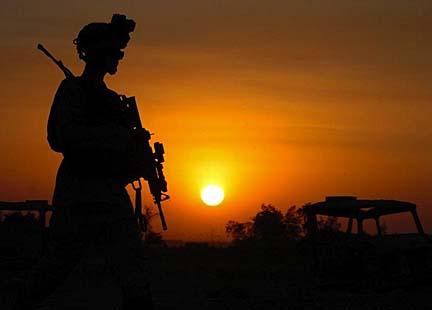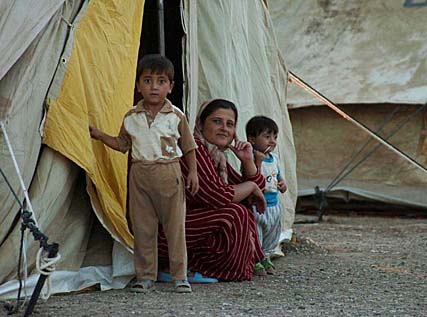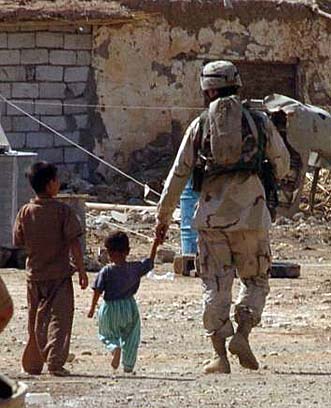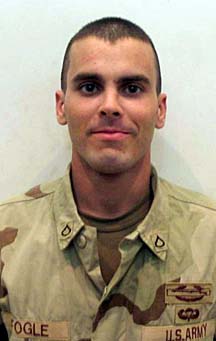

|
A Soldier’s Story First Sgt. Robert Jennings |
![]()

|
Calm helps troops
focus on reconstruction
16 Aug 04 >> Gunfire erupts all over the city. Our observation posts are reporting automatic fire in all directions. I went out to the front of the house and could see tracer rounds lighting up the sky. Immediately, the interpreters alerted the police stations.
About two minutes later, we received word from another interpreter that the Iraqi men's soccer team had won their match against Costa Rica and had made it to the medal round.
Celebration. This is how it is done over here.
Quiet. If I could explain this week in one word, it would be quiet. Other than the celebration on Monday, we have had no automatic gunfire or explosions in the city.
"Information angel" update >> It seems Spc. Charles Woolwine is continuing in his recovery. He is working extra hard in physical therapy and only relaxes when he has to turn in his leg for adjustments. It seems the adjustments are taking more time because of the influx of soldiers with amputations to Walter Reed.
He was able to go to New York to participate in a 5K race. He had to use a hand cycle because he has not yet learned to run on his new leg.
Myrna Bein, Woolwine's mother, has written some very touching words in her e-mails to family and friends. I enclosed two short paragraphs from this week's e-mail because I know there are mothers, fathers, brothers, sisters and spouses out there with similar thoughts. I just want them to know that they are not alone.
"I keep thinking a time will come when it doesn't hurt so much to watch Charles struggling to recover. Watching what is left of his right leg withering up and growing ever smaller is something I know is normal, but in my dreams at night I see him at about 17, running so smoothly and beautifully, and when I awake to reality I know how cruel this new 'normal' is.
"Sometimes, still, when I see him, I find my heart clutching, and I have to take a deep breath and swallow hard to keep the tears at bay. My tears won't help him; hopefully, my support and encouragement will."
Thank you Myrna, for your continued support of Alpha and all our soldiers participating in combat operations around the world.

|
I also received a letter from Woolwine this week. He has assured me that he is working extra hard and is learning to deal with his new leg. Not a day goes by that I don't think of my five soldiers no longer present here.
The quiet this week has allowed us to concentrate on reconstruction and stability operations. We have made daily trips out to the new tent city on the outskirts of the town. On Tuesday we were able to arrange a meeting with one of the more influential Kurdish council members, the chief and deputy chief of police, the leaders of the tent city and the leaders of the surrounding Arab villages. In a country that does not have a lot to offer its people at the moment, land is a huge issue.
When the Kurdish settlers came in and started squatting on land close to two Arab villages, the potential for conflict always was present. The Arab villagers were upset because they thought the new settlers were stealing what was rightfully theirs. The meeting was to try to get all parties to agree on a boundary for the tents.
With the help of an interpreter, I was able to speak with a few of the villagers from both sides.
One Kurdish villager said that they are poor and have no place to go. He added: "I just want what is right for my family. Saddam took this land from my family 30 years ago and now that he is gone, I want it back."
The Arabs from the villages have a different idea. One of them said: "These people are not from here. The political parties are moving them here so they can get more votes in the upcoming elections."
Until the government decides what they are going to do with these camps and land allocation, we will just continue to try to keep tensions low between these two factions.
In the end, the chief of police made the final say where the boundary was, and everyone seemed in agreement.
This was what the coalition forces like to see: Iraqi officials making the decisions that will eventually shape their country. We will continue to monitor this highly volatile area over the next few months.
Near the end of the week we were able to finally deliver some more medical machines and an ambulance to a clinic in Amu Shabi.
We were able to use some money allocated to improving the medical conditions in the town. We have stocked their clinic with some new machines for routine checkups. This has helped them to diagnose from their clinic, which previously had to be done at the hospital. The icing on the cake was the ambulance.
Since we enforce an 11 p.m. curfew here in Kirkuk, getting to and from the hospital was a huge hassle for outlying villages. Just the smile on the village leaders' faces was an indication of satisfaction.
God bless and aloha.

|
Scope of duties
surprises soldier

|
Fogle said he watched the news a lot before we left to get an idea of what we were heading into. He added: "I thought we were going to be in the thick stuff from the beginning. I thought that was all the Army did. I was surprised that we not only kill the enemy, but we do things like help the civilian people like rebuild schools and hand out needed supplies."
I asked Fogle what the most enjoyable thing he has done while in Iraq. He said: "Anything that has to do with the kids. All the adults have to really be looked at strong. As for the children, they are the innocent byproduct of this society." He went on to say, "They aren't the ones involved in the rocket attacks or drive-by shootings. So anything dealing with them is enjoyable."
I asked Fogle what has been the most stressful thing that's happened here. He said: "There's not too much that can stress me out. If I had to say something it would be when we get visitors or have a ceremony. Everyone seems to get in a mood trying to make everything to look right while other people are at the patrol base."
He finished his interview by saying hi to his family in South Carolina: "I just want my parents and brothers to know I'll hopefully be home soon. If it's not soon, I know you'll still be there for me."